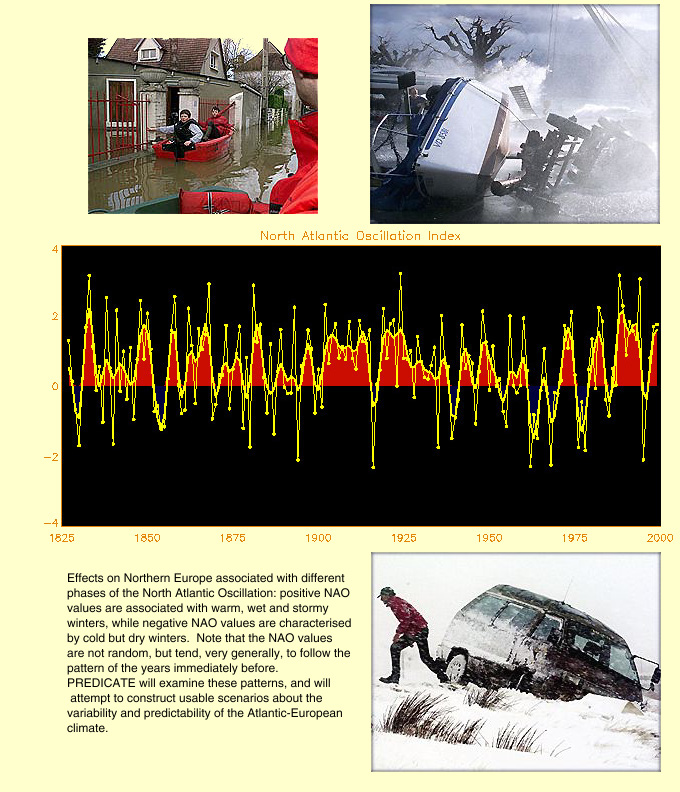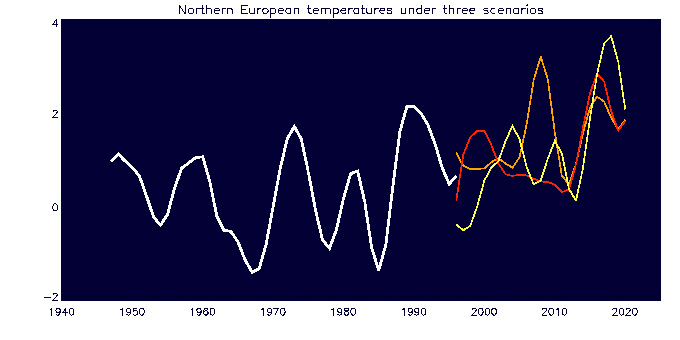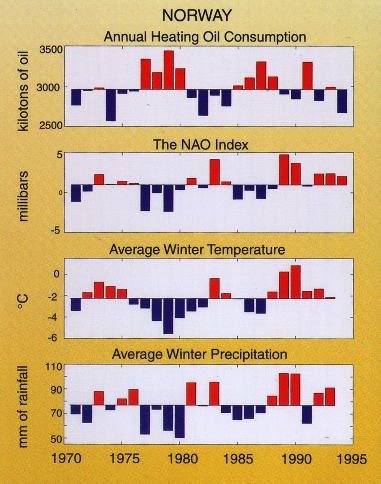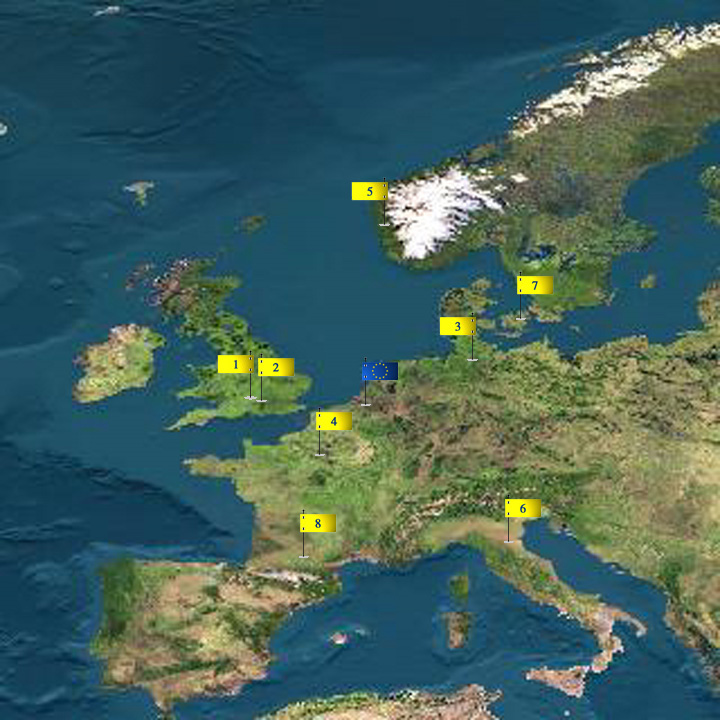European Climate in the Next Decade
1. The Importance and Causes of Climate Variations
Climate variations in the past have had a tremendous impact on the course
of human history, allowing some civilisations to flourish while driving
others to migration or collapse. Despite the spread of modernisation and
industrialisation throughout the world in recent times, droughts, floods
and other extreme climate events continue to cripple many regions.
 Variations
in climate occur on a wide range of timescales and have many different
causes. Much of the year-to-year variability arises from processes that
are internal to the atmosphere, while on longer timescales other factors
such as the state of the oceans become important. Adding to the purely
natural factors, it now appears that human activities - in particular the
burning of fossil fuels - have begun to affect the Earth's climate by changing
the composition of the atmosphere. This anthropogenic influence is expected
to dominate climate change over the next century, presenting a major challenge
of adaptation to human institutions.
Variations
in climate occur on a wide range of timescales and have many different
causes. Much of the year-to-year variability arises from processes that
are internal to the atmosphere, while on longer timescales other factors
such as the state of the oceans become important. Adding to the purely
natural factors, it now appears that human activities - in particular the
burning of fossil fuels - have begun to affect the Earth's climate by changing
the composition of the atmosphere. This anthropogenic influence is expected
to dominate climate change over the next century, presenting a major challenge
of adaptation to human institutions.
Climate Risk and Strategic Planning
In spite of the evident importance of anthropogenic climate change, the
long timescales involved can make it seem an abstract point for those trying
to run businesses today. The time horizons considered in strategic planning
rarely extend beyond a few decades at most, and thus it can be hard to
see how projections for 2050 are relevant. Nevertheless, the potential
impacts of a changing climate need to be taken seriously. Firms can normally
survive short-term climate fluctuations through insurance, for instance,
or by drawing on existing capital. However, if adverse climatic conditions
become more frequent than in the past then insurance premia may rise, capital
reserves may diminish or demand may decline considerably.
Climate change presents opportunities as well as threats, but in the
face of considerable uncertainty businesses will increasingly need to incorporate
climate as a significant factor in their risk management strategies. To
do so they will need the best possible advice from the scientific community
about the range of likely scenarios and their probabilities. Furthermore,
this information must focus on the time horizons between a few years and
a few decades that are most relevant for strategic planning. How this information
can be obtained is the problem of decadal climate prediction. This is the
problem which the PREDICATE project is addressing.
The Science of Climate Prediction
Since weather forecasts for Europe rarely have skill for time horizons
beyond a week, it is perhaps surprising that climate forecasting is possible
at all. Prediction of future climate relies on the fact that some of the
factors which influence climate are predictable much further in advance
than are normal weather variations. The rising levels of "greenhouse gases"
in the atmosphere constitute one such factor; another, of particular importance
for PREDICATE, is the role of the oceans. Fluctuations in the oceans are
sometimes predictable years in advance, and the ocean state exerts an influence
on the atmosphere via the sea surface temperatures. There is evidence that
some of the variability in European climate is linked to changes in sea
surface temperatures.

Climate prediction in practice relies on the use of complex computer
models which simulate the behaviour of the atmosphere, ocean and other
elements of the climate system (e.g. ice, land). Also required are observations
of the present state of the climate system. Detailed information about
the present state of the oceans has traditionally been ignored in climate
change prediction, because for time horizons of 50-100 years its influence
is believed to be small. For shorter decadal timescales, however, its influence
may be crucial. Investigating how the present state of the ocean constrains
climate scenarios for the next few decades is a major focus of PREDICATE.
About PREDICATE
PREDICATE is a fully funded European Union Framework 5 project designed
to address the problem of decadal climate prediction, with specific focus
on the climate of the North Atlantic-European region. PREDICATE is a collaborative
partnership involving 8 of the leading climate science institutions in
Europe (see back cover).
 A vitally important
goal of PREDICATE is to ensure that the outcomes from the research programme
are communicated effectively to businesses and other organisations who
need the information to develop and improve their strategies for managing
climate risk. To this end we are working with climate impacts institutions
such as the UK Climate Impacts Programme to identify business needs and
to establish a dialogue between the scientists conducting the research
and members of the user community. Scientists have to understand the needs
of user organisations to ensure results are made relevant. Equally, potential
users of PREDICATE outputs need to understand the nature of the information
available, and also need to consider seriously how climate risk could potentially
affect their operations. Ultimately, communication between users and scientists
will determine the usefulness of PREDICATE. If you wish to find out more
about PREDICATE and if your organisation would like to become an active
partner in the PREDICATE science-user dialogue please contact:
A vitally important
goal of PREDICATE is to ensure that the outcomes from the research programme
are communicated effectively to businesses and other organisations who
need the information to develop and improve their strategies for managing
climate risk. To this end we are working with climate impacts institutions
such as the UK Climate Impacts Programme to identify business needs and
to establish a dialogue between the scientists conducting the research
and members of the user community. Scientists have to understand the needs
of user organisations to ensure results are made relevant. Equally, potential
users of PREDICATE outputs need to understand the nature of the information
available, and also need to consider seriously how climate risk could potentially
affect their operations. Ultimately, communication between users and scientists
will determine the usefulness of PREDICATE. If you wish to find out more
about PREDICATE and if your organisation would like to become an active
partner in the PREDICATE science-user dialogue please contact:
Dr Dave Frame (External Relations Manager) or
Dr Rowan Sutton (Project Coordinator)
Centre for Global Atmospheric Modelling, Department of Meteorology,
University of Reading,
Reading RG6 6BB
United Kingdom.
PREDICATE science partners:
1. UGAMP The United Kingdom
Universities Global Atmospheric Modelling Programme, Reading, UK (coordinating
partner).
2. The Met. Office The
Met. Office, Bracknell, UK.
3. MPI Max Planck Institut
f?r Meteorologie, Hamburg, Germany.
4. LODYC
Laboratoire d'Oc,anographie Dynamique et de Climatologie, Paris, France.
5. NRSC Nansen Environmental
and Remote Sensing Research Centre, Bergen, Norway.
6. ING Istituto Nazionale di
Geofisica, Bologna, Italy.
7. DMI Danmarks Meteorologiske
Institut, Copenhagen, Denmark.
8. CERFACS The European
Centre for Research and Advanced Training in Scientific Computation, Toulouse,
France.
PREDICATE is funded
by the Fifth Framework Programme (FP5) of the European Union under the
Energy, Environment and Sustainable Development thematic programme.

 Variations
in climate occur on a wide range of timescales and have many different
causes. Much of the year-to-year variability arises from processes that
are internal to the atmosphere, while on longer timescales other factors
such as the state of the oceans become important. Adding to the purely
natural factors, it now appears that human activities - in particular the
burning of fossil fuels - have begun to affect the Earth's climate by changing
the composition of the atmosphere. This anthropogenic influence is expected
to dominate climate change over the next century, presenting a major challenge
of adaptation to human institutions.
Variations
in climate occur on a wide range of timescales and have many different
causes. Much of the year-to-year variability arises from processes that
are internal to the atmosphere, while on longer timescales other factors
such as the state of the oceans become important. Adding to the purely
natural factors, it now appears that human activities - in particular the
burning of fossil fuels - have begun to affect the Earth's climate by changing
the composition of the atmosphere. This anthropogenic influence is expected
to dominate climate change over the next century, presenting a major challenge
of adaptation to human institutions.

 A vitally important
goal of PREDICATE is to ensure that the outcomes from the research programme
are communicated effectively to businesses and other organisations who
need the information to develop and improve their strategies for managing
climate risk. To this end we are working with climate impacts institutions
such as the UK Climate Impacts Programme to identify business needs and
to establish a dialogue between the scientists conducting the research
and members of the user community. Scientists have to understand the needs
of user organisations to ensure results are made relevant. Equally, potential
users of PREDICATE outputs need to understand the nature of the information
available, and also need to consider seriously how climate risk could potentially
affect their operations. Ultimately, communication between users and scientists
will determine the usefulness of PREDICATE. If you wish to find out more
about PREDICATE and if your organisation would like to become an active
partner in the PREDICATE science-user dialogue please contact:
A vitally important
goal of PREDICATE is to ensure that the outcomes from the research programme
are communicated effectively to businesses and other organisations who
need the information to develop and improve their strategies for managing
climate risk. To this end we are working with climate impacts institutions
such as the UK Climate Impacts Programme to identify business needs and
to establish a dialogue between the scientists conducting the research
and members of the user community. Scientists have to understand the needs
of user organisations to ensure results are made relevant. Equally, potential
users of PREDICATE outputs need to understand the nature of the information
available, and also need to consider seriously how climate risk could potentially
affect their operations. Ultimately, communication between users and scientists
will determine the usefulness of PREDICATE. If you wish to find out more
about PREDICATE and if your organisation would like to become an active
partner in the PREDICATE science-user dialogue please contact:
